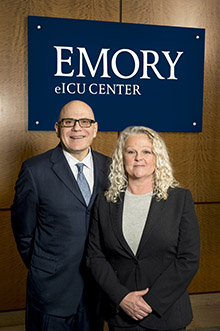Emory's Electronic ICU (eICU) Program has proven to be a valuable asset for intensive care patients and their hospital care teams, not just at Emory Healthcare but also in the community hospital setting.
A report, created by Abt Associates for the Centers for Medicare and Medicaid Services (CMS), has found that Emory's eICU innovation program, started three years ago, reduced length of patient stays in the ICU, resulted in fewer readmissions, reduced costs by millions of dollars and helped solve the shortage of intensivists -- critical care physicians who work primarily in ICUs.
Emory was one of 10 institutions to receive a Health Care Innovation Award from CMS in 2012. The $10.7 million award from CMS was used to launch and evaluate Emory's innovative plan of a collaborative network supporting intensive care units remotely in North Georgia. The idea behind the eICU program was to expand access to critical care services, lower costs and address the issue of a national shortage of critical care physicians.
Emory's eICU program included two components: 1) to establish a critical care residency training program for affiliate providers, in an effort to boost critical care management; and 2) to provide continuous, 24/7 monitoring of critical care patients and access to intensivist physicians and other support staff on night and weekend shifts, when physicians are infrequently present in ICUs.

Timothy Buchman, PhD, MD, director of the Emory Critical Care Center and Cheryl Hiddleson, MSN, RN, CCRN-E, director of the Emory eICU Center
"Emory leads the nation in the training and use of advanced practice providers (APP), such as nurse practitioners and physician assistants, in the critical care setting," says Timothy G. Buchman, PhD, MD, director of the Emory Critical Care Center and professor of surgery and anesthesiology at Emory University School of Medicine. "This innovative program was set up to train APPs working alongside critical care nurses at the bedside, and to provide support by experienced Emory intensivists and Emory critical care nurses around-the-clock from a remote location."
The eICU program began in 2014 in critical care units at Emory University Hospital, Emory University Hospital Midtown and Emory Saint Joseph's Hospital. Later that year, it expanded to two smaller community hospitals – Emory Johns Creek Hospital and East Georgia Regional Medical Center in Statesboro, Ga.
"The goal was to improve quality of care, shorten ICU lengths of stay and discharge patients in a better state of recovery, potentially reducing Medicare spending," says Cheryl Hiddleson, MSN, RN, CCRN-E director of the Emory eICU Center.
During the evaluation period (from April 1, 2014 to June 30, 2015), 8,019 patients were cared for by the Emory eICU. More than 60 percent of those patients were federal beneficiaries. The report reveals a reduction of $1,486 in Medicare spending per patient stay, saving $4.6 million during the 15 month evaluation time.
"We attribute those savings to standardizing our care delivery and offering more immediate access to intensivist led interventions," says Hiddleson. "Our patients are being discharged more frequently to home settings instead of long term care or rehab because they have more consistent care in the hospital."
The greatest savings were found in the larger university hospitals (Emory University Hospital and Emory University Hospital Midtown), likely owing to the high acuity (severity of illness) of the patients at those two hospitals and a higher cost of care.
Philips, the global health technology company, powers the eICU program in place, which includes installed cameras, video monitors, microphones and speakers in ICU rooms at the five hospitals, as well as in the control rooms at three hospitals for 24/7 monitoring, observation and communication with on-site staff and patients.
The program's remote monitoring of patients was credited to numerous "saves" when problems were brought to the attention of bedside staff that might have otherwise gone undetected. ICU staff reported that the most important benefit of the eICU was the timeliness of emergent interventions during the night and the rapid attention to patients' needs -- rather than waiting for ICU physicians to return in the morning.
"The final CMS report found that Emory's innovation reduced the length of stay in the ICU, improved the experience of care, and led to lower costs," says Buchman. "Patients were discharged healthier and had fewer readmissions for 60 days following their inpatient stay, relative to a comparison group." The comparison group was made up of nine hospitals in the region with similar patient population and case mix index (a measure of resources needed to treat the mix of patients) as the Emory eICU monitored group.
Medicare pays for home health care in 60-day increments and more of Emory's critical care patients were discharged with home health care. This may have contributed to the reduction in 60-day readmissions, according to the report.
Other program benefits that are difficult to measure include: reducing physician burn-out, improving adherence to standardized clinical guidelines, and enhancing communication and critical care knowledge of entire care teams.
"As the nation ages and chronic illnesses accumulate, the need for timely and effective critical care continues to grow," says Hiddleson. "The Emory eICU innovation offers patients, families, hospitals and payers a high-quality, cost-effective strategy to ensure that critical care can be provided when and where needed."

